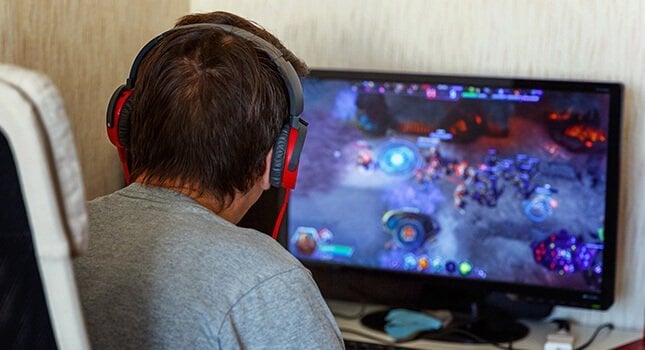A parent acting with the best intentions may actually increase their child’s risk of becoming a gaming addict – or deepen an existing addiction. In this post, we explore the nature of video game addiction and offer tips on how to help your son escape its clutches.

Sharelines
- Acting with the best intentions doesn’t always mean you’re putting his best interests first. #TheEdge #GamingAddiction #GamingTips
- Am I accidentally turning my son into a gaming addict? If you’re doing any of these six things, you may be causing more harm than good. #TheEdge #GamingAddiction #GamingTips
Kids today spend more time in front of screens than any generation before them. Smartphones, tablets and old-fashioned televisions are a reality of modern life. While most parents agree on the need to monitor and restrict screen time for their kids, merely acknowledging the issue isn’t nearly enough. Enforcing limitations is essential.
Of all the varieties of screen-based activities proliferating and vying for young people’s attention, video games are of particular concern. They’re an ever-present medium – from consoles and handheld games to smartphones and computers. And the unique way in which kids interact with them makes them particularly dangerous in terms of addiction.
An addiction to video games is a process addiction, in the same category with gambling addiction or pornography addiction. It may not be fuelled by external chemicals that your son ingests, but it still works on the brain in the same way as drugs and alcohol. It taps into his reward system and effectively ‘rewires’ his pleasure circuits to the extent that passing levels, beating opponents and achieving goals in the game results in a hit of dopamine.
That hit has a profound effect, as dopamine is a powerful neurotransmitter. Repeat this process often enough, and addiction emerges. Make no mistake: gaming addiction is every bit as real as a drug addiction.
Parenting Missteps Could Contribute to Video Game Addiction
If your son’s video-game playing behaviour is becoming problematic, it may be time to take a step back to consider how your reaction as a parent is playing into the situation. Keep the following considerations in mind:
1. Many gaming addicts had access early in life.
Young minds are pliable and plastic. They’re hard at work forming the neural pathways that will govern their experience over the course of their lives. Too much early screen time has a profoundly negative effect on young minds – interfering with the development of crucial social skills, as well as the ability to concentrate and focus. It also develops and strengthens the reward-response pathways that lead to gaming addiction.
2. Making it too easy for him to play could encourage his addiction.
The risk of your son developing a gaming addiction increases significantly once he has easy access to a gaming console. If you choose to have a console in the house, it’s a good idea to set up (and enforce) barriers to access.
3. Rewarding good behaviours with special gaming access could backfire.
As already mentioned, gaming accesses the brain’s reward system. The dopamine response games generate in the brain reinforce the desire to play. A study conducted in Stanford found that while both genders experience this phenomenon, men are particularly susceptible to reward-centre stimulation while gaming. With that in mind, parents are well-advised not to use video game access as an incentive or bargaining chip with their kids (and especially their sons). Their brains are already getting enough positive-play reinforcement as it is.
4. Bending the rules could help him become a gaming addict faster.
If your son is developing a gaming addiction, he’s going to experience ‘cravings’ that lead to irritability when he’s not able to play. This response is standard protocol for addicted brains; it’s by no means exclusively associated with substance abuse. This means that – as a parent – there will be times when it’s simply easier to cave to his compulsion rather than stand your ground. Just understand that feeding these cravings will only exacerbate the addiction.
5. Gamifying his access just becomes part of the ritual.
When parents tell their children that it’s time to turn off the console, the kid’s response often sounds something like, “Just one more level!” or “Just five more minutes!”. This turns into a routine and, eventually, the allotted gaming time becomes flexible. Don’t gamify access to video games so that the act of prolonging the end actually becomes part of the gaming experience. Instead, consider giving a five- or ten-minute warning followed by a firm shut-down.
6. Covering for a gaming addict you love isn’t helping.
Addiction is complicated but predictable, with common identifiers seen across all forms of this brain-based disease. One particularly heartbreaking aspect of addiction is the co-dependent relationship that develops between the addict and those closest to him. You may find yourself covering for your son by taking on some of his responsibilities to soften the negative impact of his gaming addiction. Perhaps you do his chores yourself, because it’s easier than confronting him. Or maybe you find yourself completing his homework for him or lying to his boss to cover up the fact that he skipped work so he could stay home gaming. The impulse to cover for him comes from a place of love, but it’s only going to strengthen the power of his addiction.
How Do I Know if My Son is a Gaming Addict?
Go with your instincts. If you suspect that your son is addicted to gaming, then you have, at minimum, a situation that warrants further investigation. The warning signs are similar to those of other process addictions. Be mindful of any combination of the following:
- The frequency that he plays (or the duration of his gaming sessions) is increasing noticeably.
- He plays video games when he should be doing homework or working.
- He professes a desire to spend less time playing video games, but is unable to achieve this.
- Efforts to limit the time he spends gaming make him irritable or moody.
- He foregoes social activities and sporting events in favour of playing video games.
- He appears disinterested in real-world or offline activities.
- He spends more time alone than usual.
- He lies or tries to cover up the amount of time he spends gaming.
Gaming Addiction Treatment at The Edge
Gaming addiction for young men is treatable. If you’ve taken steps to control your son’s gaming addiction, but nothing has worked, contact The Edge. We provide effective treatment for video game addiction at our resort-like inpatient centre in Northern Thailand. Our whole-body approach combines cognitive behavioural therapy, individual and group therapy and physical activity.
We can give your son the help he so desperately needs. Contact us today to find out more.





